Water Forum of El Salvador Opposes the Government's Mining Suspension
- Details
-
Published: Wednesday, 22 August 2012 14:07
Water Forum of El Salvador Opposes the Government's Mining Suspension
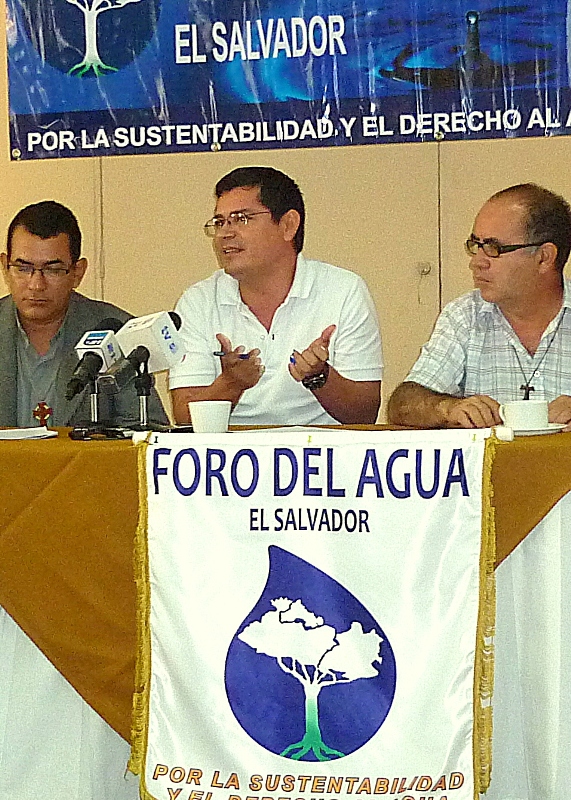
Today, sitting beneath banners that read “For sustainability and the Right to Water” the Water Form of El Salvador held a press conference to express their disapproval for the Mining Suspension Bill presented by the Executive Branch of the Salvadoran Government, as well as their support a bill that would definitively ban all metallic mining in El Salvador.
The Water Forum criticized the fact that the Government’s bill is only a temporary solution to the debate around mining and said that by not addressing this problem and by allowing mining, the Salvadoran government would be condemning future generations to an irreversible legacy. According to a representative from JPIC (member of the Water Forum) “the government is not listening to the Water Forum’s outcry” in demanding respect for the human right to water.
They also emphasized that “this is not the problem of the government in power, this is a national problem.”
Below is a translation of the Water Forum’s press release.
Press Release
El Salvador, whose national territory is approximately 20,935 km2, has 300 main rivers, according to the River Water Quality Report of 2011, published by the Ministry of the Environment and Natural Resources (MARN), of which only 10% of the water quality can be classified as “good” and where the other 90% is classified as average, poor or terrible. There are is no water that can be classified as excellent.
In addition to the serious situation of contamination of our rivers, mining exploration and exploitation projects pose a threat to the life of main bodies of water in the country: the Guija Lake, the Lempa River, the Paz River, the Torola River, and the Goascoran River, among others.
On August 7th, 2012, the Ministry of the Economy and the MARN presented a bill called the “Special Law for the Suspension of Administrative Procedures Related to Metallic Mining” in the Legislative Assembly. In response to this situation, the organizations, churches, and communities that make up the Water Forum CONSIDER:
a) That the impacts of metallic mineral exploitation in our country cannot be addressed by improving administrative procedures. This is a problem that is tied to our country’s small size, the population density, the location of proposed mining projects on our main bodies of water, the irreversible damages caused by the mining industry and the level of environmental fragility of our country.
b) That trying to overcome the threat mining projects pose with an initiative like that proposed by the Executive Branch, can only be seen as a desperate attempt responding to the central government’s need to keep its promise of not allowing metallic mining projects during its term, with out addressing the fact that this is not a definitive solution for the problem.
In response to the aforementioned factors, WE STATE:
1. Our complete disapproval for the bill presented by the Executive Branch, because it is only a temporary solution and not a definitive ban on mining projects in our country.
2. We call on the Legislative Assembly to urgently resume the analysis, and discussion and approve the Mining Bill presented by the National Roundtable against Metallic Mining in November 2006.
3. We demand that the Legislative Assembly have a transparent discussion around the revision of the proposed mining bills, during which the respect for the human right of the Salvadoran population prevails over the economic interests of the extractive industry.
San Salvador, August 22, 2012
For more information email: comunicaciones.forodelagua@gmail.com
Al Gedicks and Eric Hansen: Mine law needs public process, not ‘consensus’
- Details
-
Published: Friday, 18 May 2012 12:35
Al Gedicks and Eric Hansen: Mine law needs public process, not ‘consensus’
AL GEDICKS AND ERIC HANSEN | UW-La Crosse professor (Midwest Coalition against Lethal Mining member) and outdoor writer, respectively
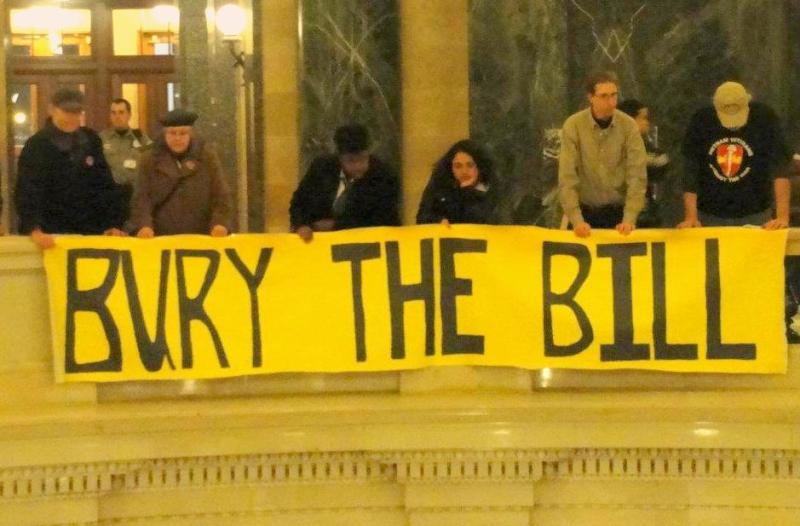
If no mining company has been able to meet the standards of Wisconsin’s mining moratorium law, it does not mean the law is flawed and in need of revision. It means the mining industry’s claim of being able to mine safely lacks scientific merit.
Gogebic Taconite may have temporarily abandoned its proposed open pit iron mine at the pristine headwaters of the Bad River, but company spokesman Bob Seitz says the firm still wants Wisconsin’s mining law changed. Efforts are under way to develop a new “consensus” on legislation that failed to pass the Senate in the last session.
George Meyer, executive director of the Wisconsin Wildlife Federation, has met with Tim Sullivan, president of the Wisconsin Mining Association, to develop a compromise bill. According to Meyer, WWF and the mining association “agree on 90 percent” of the issues.
Something is wrong with Meyer, Sullivan and other interested parties getting together to work out “consensus” legislation that would allow GTac and other proposed mines to go forward. That process would elevate an unrepresentative group over the broad, thorough civic discussion and scientific investigation that has served this state’s citizens, and its water, so well
When Wisconsinites last saw this “consensus” approach to mining legislation, it resulted in regulations allowing groundwater contamination beneath and around mine sites. That ill-advised legislation was the result of a 1980s push by mining companies (Exxon, Kennecott and Inland Steel) and the Department of Natural Resources to overturn the previously existing policy of nondegradation of groundwater. Kennecott then obtained a permit for its Flambeau open pit copper and gold mine at Ladysmith in the early 1990s. Kennecott’s own monitoring wells now show the groundwater there is highly polluted with sulfates and various metals.
Wisconsinites thoroughly rejected the lax regulation that that “consensus” developed. In 1998 a broad-based alliance of conservation-minded citizens succeeded in passing Wisconsin’s common sense “show me it is safe first” mining moratorium law. A 29-3 bipartisan vote in the state Senate reflected the depth of support.
This wise law reflects a high regard for due diligence and reasonable prudence — but did not ban mining. It simply requires mining companies to prove their proposed mine would not pollute groundwater or surface water where sulfides are present in the ore body or the rock surrounding the ore body.
Sulfides exposed to air and water create acid mine drainage. Exxon could not meet the requirements of the law and withdrew from the controversial Crandon mine project, which threatened the Wolf River, in 1998.
Read more here…

World Water Week
- Details
-
Published: Saturday, 31 March 2012 12:48
World Water Week in El Salvador
March 2012
Joining people and communities celebrating World Water Week across the planet, the Salvadoran Environmental Alliance, including National Roundtable against Metallic Mining (the Mesa in Spanish), organized a number of activities demanding respect for the human right to water.
For more information about the goals of the Environmental Alliance (in Spanish)
The week began with a protest in front of the state-run Salvadoran energy company demanding the halt of the construction of a number of hydro-electric dam projects that are proposed for rivers throughout El Salvador. .
The Mesa Calls the Legislative Assembly’s Hand
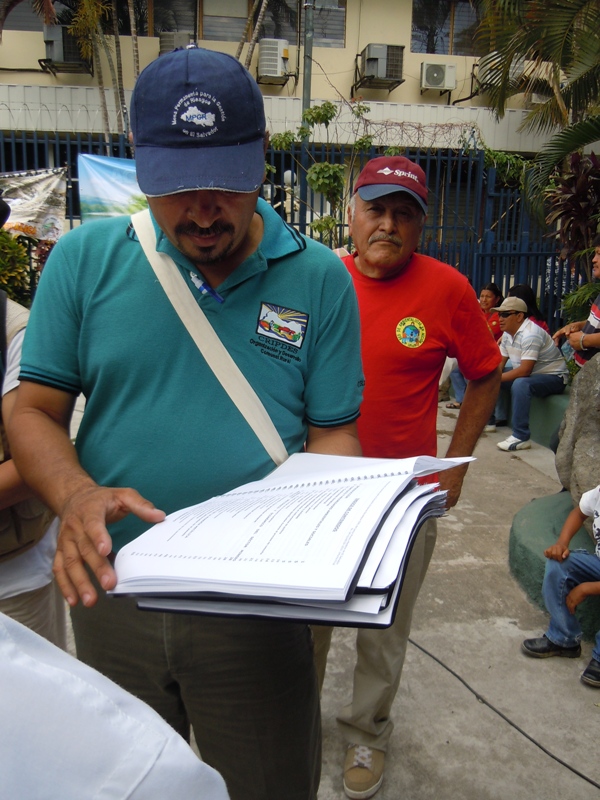 The Mesa staged their own protest outside the Legislative Assembly on Wednesday the 21st, demanding that the Assembly take up the debate on whether to ban mining. Since 2010 the Assembly has refused vote on the issue, saying they wanted to wait for the results of the Strategic Environmental Assessment (SEA) which was proposed and overseen by the Ministries of the Economy and of Environment. However, as time dragged on and the assessment process came and went, the SEA has never been released, and the Assembly continues to refuse to deal with the issue.
The Mesa staged their own protest outside the Legislative Assembly on Wednesday the 21st, demanding that the Assembly take up the debate on whether to ban mining. Since 2010 the Assembly has refused vote on the issue, saying they wanted to wait for the results of the Strategic Environmental Assessment (SEA) which was proposed and overseen by the Ministries of the Economy and of Environment. However, as time dragged on and the assessment process came and went, the SEA has never been released, and the Assembly continues to refuse to deal with the issue.
Through unofficial channels, the Mesa obtained a copy of the SEA and brought printed copies to the rally on Wednesday. They gave copies to the all the major political parties as well as some press covering the event. They demand that the Assembly both pressure the central government to release the SEA publicly, and stop using it as a pretext to ignore the mining ban.
The very same day, almost 2,000 miles away a group of Mesa supporters were leafleting at the World Bank around the very same issues. For the last four weeks, representatives from different D.C. based organizations have been handing out flyers to World Bank employees about Canadian mining company Pacific Rim’s case against the Salvadoran government.
In spite of the weighty subject matter, the protest was an uplifting and spirited event, with speeches from community leaders, chants and a hilarious anti-mining play presented by a youth theater group from Chalatenango.
For the Mesa’s press release in English about the decision to release the SEA see here. For the Spanish version see here.
For the complete SEA, in Spanish.
For pictures from the protest.
For Spanish press coverage see the Diario Contra Punto and Diario La Pagina.
Government’s Water Reform Proposal Fall Short
On Thursday, March 23, the Salvadoran Environmental Alliance (The Water Forum, The National Roundtable against Metallic Mining, the Movement to stop hydro-electric dams, and the National Roundtable of Natural Disaster Mitigation) held a rally in front the Legislative Assembly in commemoration of World Water Day, but also to pressure for laws that protect El Salvador’s natural resources. Over 1,250 people packed into the small park in front of the Assembly with signs and banners demanding their human right to water. As community leader, Vidalina Morlaes said, “I’ve never seen so many people [in front of the Legislative Assembly].”
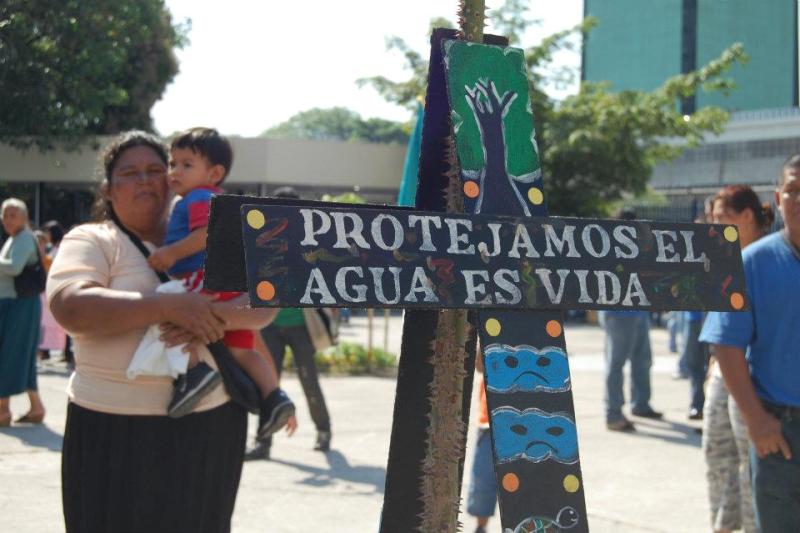 The central government, through the Ministry of the Environment and Natural Resources (MARN in Spanish), took advantage of the occasion to present a General Water Law that would reform current legislation. The Salvadoran social movement had presented its own proposed legislation to the Assembly the last year, but the bill has never been discussed nor voted on.
The central government, through the Ministry of the Environment and Natural Resources (MARN in Spanish), took advantage of the occasion to present a General Water Law that would reform current legislation. The Salvadoran social movement had presented its own proposed legislation to the Assembly the last year, but the bill has never been discussed nor voted on.
At first, the Environmental Alliance was heartened by MARN’s proposal because they had been in a process of dialogue with the government. However, upon reading the proposal they have decided that the legislation falls short.
In a press release from March 30th, the Water Forum called the government’s proposed bill “insufficient and weak” claiming, “it doesn’t respond to the gravity of the water crisis in the country.” The press release strongly criticizes the lack of regulation and oversight for water resources, the absence of a mechanism for civic participation in decisions related to water, and the fact the bill does not reference the problems mining and hydro-electric dams create for water resources. It finished by urging that the Assembly discuss and pass the bill presented in 2011 by the social movement.
The decision is now in the hands of the Assembly, but what has become clear is that comprehensive water reform and regulation is still a distant reality.
For pictures and video of the World Water Day rally.
International Movement Building around World Water Day
Because El Salvador is such a small country and the majority of its water originates outside its national territory, the struggle to ban mining also needs to transcend the country’s borders. Therefore, the Mesa and the organizations and communities struggling to ban mining have been working to connect with groups in Honduras and Guatemala who share their goals for protecting natural resources.
To celebrate World Water Day, the Center for Commerce and Investment Research (CEICOM), Bicicritica and the Mesa organized two events on the border of El Salvador and Guatemala to highlight the importance of the Guija Lake for both countries and the damages mining projects on that lake would bring.
On Friday the 23rd CEICOM organized a march, with over 800 participants in the border town of Metapán followed by an afternoon of music, theater and education on the edge of the Guija Lake. On Sunday the 25th, the critical mass bike group, Bicicritica, and the Mesa organized a bike ride ending at the same lake. Both events included participation from Salvadorans and Guatemalans and helped strengthen the ties needed to build a solid cross-border movement.
For pictures of the rally and of the bike ride.
For more information in Spanish.
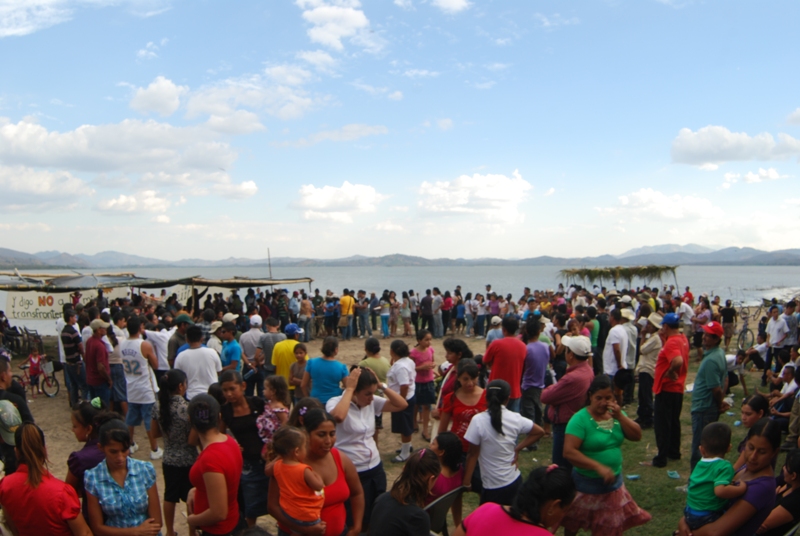
VanHollen Letter Spn
- Details
-
Published: Wednesday, 21 March 2012 16:36
Congreso de los Estados Unidos
Cámara de Representantes
Washington, DC 20515
10 de noviembre del 2009
Lic. Romeo Barahona
Fiscal General de El Salvador
San Salvador, El Salvador
Felicidades en ser nombrado Fiscal General de la Republica de El Salvador. Me gustaría expresar mi esperanza para nuevas relaciones entre nuestros países y nuevos gobiernos.
En su discurso de toma de posesión, el Presidente Mauricio Funes habló de la importancia de fortalecer el estado de derecho y reducir la impunidad y corrupción en El Salvador. Como expresó el Representante James McGovern en una carta dirigida al Presidente en Junio, muchos miembros del Congreso de los Estados Unidos, inclusivo mi persona, queremos apoyar a sus esfuerzos de fortalecer la democracia y mejorar la seguridad pública para todos los y las salvadoreños/as.
Aunque su Oficina ha demostrado el compromiso de luchar en contra del crimen organizada y la violencia política a través de investigaciones de varios casos serios que se llevan a cabo, me gustaría llamarle la atención a la importancia de darle seguimiento a la investigación del caso de Gustavo Marcelo Rivera Moreno. Como quizás sepa, Señor Rivera fue desaparecido el 18 de junio, 2009. Su cadáver fue encontrado en un pozo seco en la zona rural de Cabañas, con señales de tortura brutal, el 1 de julio del 2009.
El señor Rivera fue un líder comunitario muy activo en la política local y el movimiento nacional contra la minería metálica. Así que, muchos de los jóvenes de un pequeño grupo pastoral de Silver Spring, Maryland, que está ubicado dentro de mi distrito, conocían al Señor Rivera. Por más de cinco años, estos jóvenes han hecho visitas cada año para trabajar en proyectos de desarrollo comunitario con las comunidades rurales de Cabañas y otros lados en El Salvador.
Es crítico asegurar justicia y asegurar que los autores intelectuales de estos crímenes son procesados hasta donde permite la ley, como de seguro usted está de acuerdo, para demostrar que el estado de derecho es primordial en El Salvador. Agradezco el trabajo que ha hecho su oficina y la Policía Nacional Civil hasta ahora con respeto al caso, lo cual ha facilitado la detención de cuatro sospechosos en Cabañas y la noticia el 7 de julio, 2009 de que el quinto ya está en la cárcel La Esperanza en San Salvador. Sin embargo, como declaró el Jefe de la Unidad contra El Crimen Organizado, Rodolfo Delgado, el 8 de julio 2009, y como el sub-director de Investigaciones del PNC, Howard Cotto, repitió cinco semanas después, los autores intelectuales del caso tienen que ser investigado, y el hecho de que varios sospechosos han sido detenidos no quiere decir que el caso ha sido resuelto ni cerrado.
Dado el trabajo saliente del Señor Rivera- como director y fundador de la Casa de la Cultura de San Isidro, miembro de la junta directiva departamental del FMLN, y como director de la Asociación de Amigos de San Isidro, Cabañas- y dado las circunstancias de su muerte, es convincente que la desaparición, tortura y asfixia del Señor Rivera no fue un acto delincuencia común pero, en cambio, violencia política. Los años y meses anteriores a su desaparición, el Señor Rivera fue un blanco varias veces como resultado de sus acciones políticas y sociales. Desde el 2006, el Señor Rivera había sido un líder sobresaliente en oposición a la industria de minería metálica y específicamente a la Corporación de Pacific Rim. Este trabajo le había hecho un blanco para la alcaldía de San Isidro, la cual hubiera recibido beneficios considerables de las inversiones de la compañía minera. En enero del 2009, el Señor Rivera fue un líder que denunció el fraude electoral al nivel municipal en las elecciones en San Isidro, lo cual resultó en una suspensión temporaria de dichas elecciones.
El incumplimiento de investigar este caso, tomando en cuenta la historia del trabajo político del Señor Rivera, ha causado cuestionamientos sobre el compromiso de El Salvador de hacer cumplir el estado de derecho. Como consecuencia de la falta de seguimiento del juicio desde julio, varios líderes comunitarios, periodistas, y curas de Cabañas, quienes han denunciado la muerte del Señor Rivera, han recibido amenazas de muerte. Muchas de estas dice explícitamente que lo que pasó al Señor Rivera podría pasar a ellos también. Ha habido dos intentos de asesinato.
Le insto, con mucho respecto, que usted investigue de profundo el caso del Señor Rivera. Una investigación completa y profunda de la Oficina de la Fiscalía General de la Republica, en coordinación estrecha con la Policía Nacional Civil y el Ministerio de Seguridad Pública y Justicia, podría mandar un mensaje fuerte a los grupos criminales y hacer una contribución significativa a la consolidación del estado de derecho en El Salvador.
Yo creo, con firmeza, que su liderazgo es necesario para fortalecer el estado de derecho, administración de justicia, y seguridad publica en su país.
Anticipo trabajar con usted y la Oficina de la Fiscalía General sobre este caso y otros con el espíritu de coordinación entre nuestros países y nuestra creencia común en las instituciones democráticas y valores.
Atentamente,
Chris Van Hollen
Miembro del Congreso de los EEUU




 The Mesa staged their own protest outside the Legislative Assembly on Wednesday the 21st, demanding that the Assembly take up the debate on whether to ban mining.
The Mesa staged their own protest outside the Legislative Assembly on Wednesday the 21st, demanding that the Assembly take up the debate on whether to ban mining. The central government, through the Ministry of the Environment and Natural Resources (MARN in Spanish), took advantage of the occasion to present a General Water Law that would reform current legislation.
The central government, through the Ministry of the Environment and Natural Resources (MARN in Spanish), took advantage of the occasion to present a General Water Law that would reform current legislation.